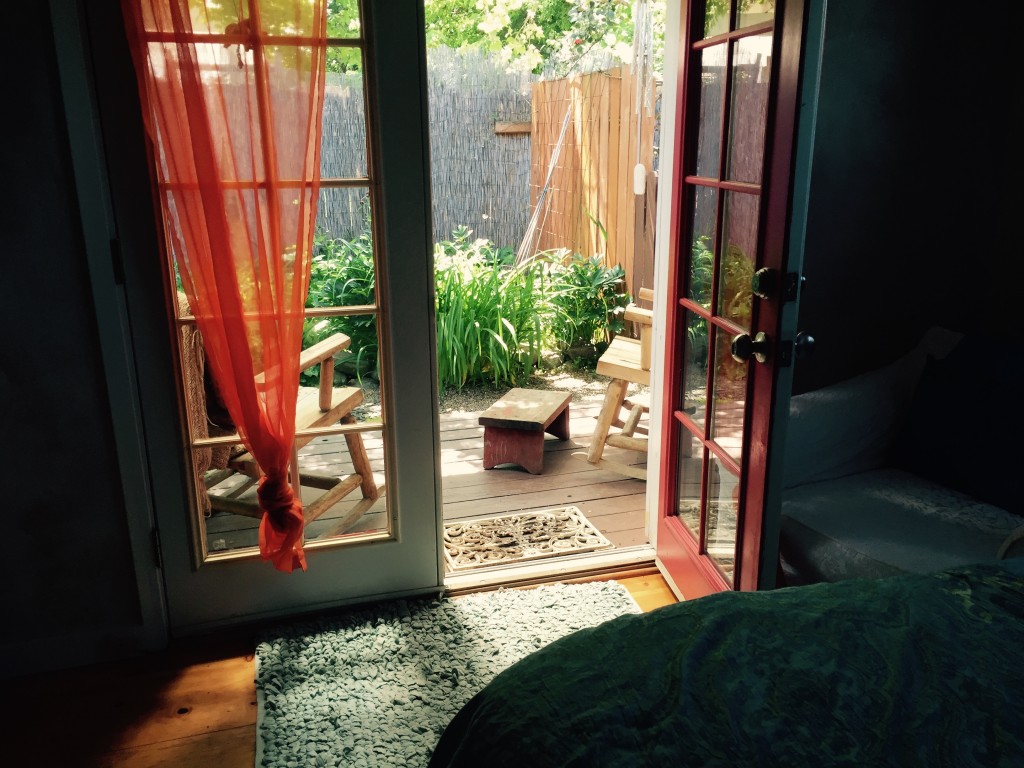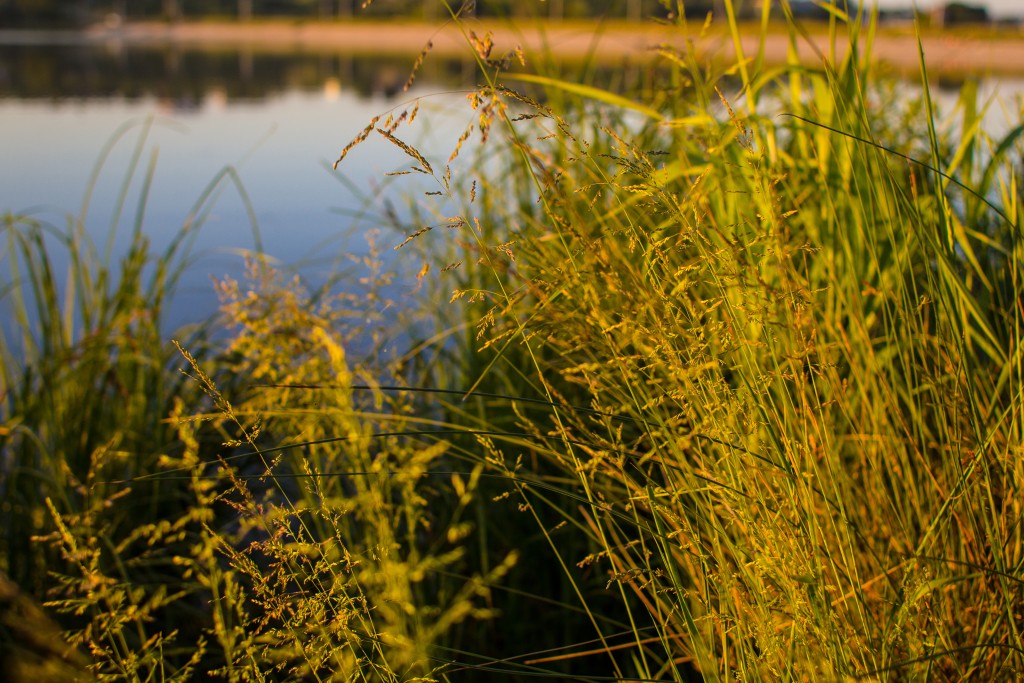“Memories are rooted in place: a lifetime of kitchens, backyards, porches, and patios. Our bedroom and our best friend’s bedroom, the street where we played until dark and our parents called us inside, the park where we picnicked, the swimming pool with its aquamarine water smelling of chlorine or the pond on the farm with its muddy banks. If you want to enter a memory, enter a room in your grandmother’s house. Remember an incident, and the place where it happened will figure prominently in the story. Everything happens somewhere, and if you want to bring the memory alive, be in the place where it occurred.

We enter these memories through our senses, though what we smell, what we see, what we hear. … Another way to enter memory is by saying the name of a place. There’s a kind of magic in naming that generalities can’t evoke. Tinker Creek, Ghost Ranch, Bean Lake. That last one I’m sure you’ve never heard of. It’s a small lake in Missouri where my family vacationed, where my father could fish and we girls could splash around in the muddy water, getting sunburned and mosquito eaten. I would only have to say ‘Bean Lake’ to my sisters, and their memories would conjure their own story of our brief, carefree time at the lake.”* …
Eudora Welty wrote in her essay, “Place in Fiction,” “We do not say simply ‘The Hanging Gardens’ — that would leave them dangling out of reach and dubious in nature; we say ‘The Hanging Gardens of Babylon’ and there they are, before our eyes shimmering and garlanded and exactly elevated to the Babylonian measurement.”
“My Bean Lake is hardly The Hanging Gardens of Babylon, but by saying its name, I am transported back to a time of childhood, and not just to the smell of lake water on sunburned skin or to the taste of cherry Popsicles that barely cleansed the residue of that muddy water from my mouth; the memory is tinted by the color of childhood — in my mind, innocence awash in sepia.”*

Exploration: Place and Memory
Write the name of a place at the top of a clean sheet of paper. Maybe it’s a place you’ve wanted to write about for some time, or maybe the name came spontaneously. If you’re writing fiction, write a place for a scene to unfold, and let the memories be those of your characters. Then enter into the writing through a particular sensory door—sight, smell, sound, taste, touch; or through a season—summer, fall, winter, spring; or through a time of day or night.
If you’d like, share your memory in the comments section below.
*from Wild Women, Wild Voices — Writing from Your Authentic Wildness, Ch. 6—Writing Place: The Geography of Our Lives

Place has become instrumental in moving me to write, recently. Briefly, my folks moved to Cathedral City from Long Beach in 1950 because they wanted to escape a truly sad memory that city brought to them: the death of their second son of leukemia at age 4. I was 8 and loved Long Beach: the Pike (an early Disneyland), the beaches, the trolleys, Houghnton Park, the miniature golf course, even the Consolidated Edison Power Plant and the swamp it emerged from (really!) in our backyard.
We moved to Cathedral City with a trailer to the back of dad’s newly purchased fruit shack on Highway 111. Can you imagine what I, an 8 year old, saw when I heard we were moving to Cathedral City? I thought I knew what a cathedral was. I knew what a city was because I lived in one. But dad said we were moving to the desert. How could there be a cathedral there?
And that was the beginning of a memory of a “city” that had no cathedral, except a faint resemblance of one as Cathedral Peak in back of the fruit stand. The “city” was a wide place in the road where the main street was called Broadway (really Highway 111) with a population of about 500, including transient farm workers left over from the Great Depression and the Dust Bowl migration. We had Andy the Donkeyman, another transient who moved about the desert floor selling rides on burros who looked like they woke up from a fight. We had Jean St. Germain who I considered the earthly representative of a saint, but who was illiterate and grumpy and stayed in his 15 foot trailer all day. We had John the cabinetmaker across the road who had recently escaped Mexico when his friend Trotski was assassinated. I found out later John’s name was really Ivan.
The list goes on–and my growth as a kid went beyond imagination.
In the fourth grade I took trumpet lessons from Mr. Dahlgren, the lead pit band cornet at Palm Spring’s Chi Chi, a classy nightclub/strip joint. The Palm Springs HS bandleader under whom I played lead trumpet was a Juliard trained cellist and trombone player.
The list of memories goes on, all of which were based on what I thought was a crazy bad move my parents made in 1950. Now the memories of place are an essential part of my writing life.
Thanks for calling attention to the importance of place, Judy.
Don, I love your Cathedral City stories, so rich with detail. Thanks for sharing these little peeks and thanks for coming to Thursday Writers every week and writing and sharing them in even more detail. I imagine your “Cathedral City” collection will be a delightful read of a time when… Thanks for posting this comment, too.
Added note: You’ll be pleased to know that most every Thursday Writers session has produced a piece far beyond what I wrote in class. The 300 word snippet I wrote a couple of days ago (“The third time….”) is now over 1000 words and growing. It looks like it might be one of the opening chapters to my 1950s memoir or now “family saga”. Thanks to Thursday Writers’ “prompting” in the fullest sense of the word, I’m getting good, meaty drafts.
Don
Added thank you: So glad Thursday Writers is serving your writing. We’re (speaking for all the Thursday Writers) so glad you’re part of our community. And by the way, I wrote many, many a raw draft to two of my novels in writing practice groups and writing marathons.
Thanks for reminding us again of the significance of place. It becomes part of our memory DNA. I love your book and hope you keep posting segments for us to re-consider. Thanks! ♥
Thanks for your comment, Leslie. You certainly know how to write “place.” I’m loving your Ranch stories (and all the others) you post on your blog. And thanks for the love note to my book. We appreciate it. xox
Great exercise. I’m a travel writer so this is always important for me and I appreciate the tips and reminder here to be sensual in the telling.
Thanks for commenting Barbara, as a travel writer, your mind must be loaded to overflowing with sensory details of all the places you’ve been. I keep journals of my travels and find it hard to keep up with all the sensory input I’m experiencing. I’d love to give travel writing a turn sometime. Thanks for bringing stories to all of us of places we might want to visit.
Judy,
Thanks you for this post about places that evoke our memories. I feel that it is a good way to get inspired to write a memory.
Hello Arlene,
Thanks for your comment and absolutely, naming a place is a great way to enter into a memory. I hope you’ll try it. For me, as soon as I say the name of a place, all sorts of sensory-detailed images fill my mind. Sometimes I can’t grab them fast enough, so first time through, I just jot them down as they come, they I begin to flesh out the memory using those sensory details in the expanded writing.